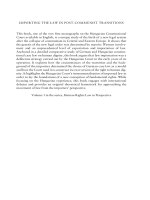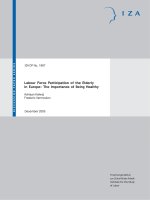- Trang chủ >>
- Cao đẳng - Đại học >>
- Luật
Internet Banking and the Law in Europe Regulation Financial Integration and Electronic Commerce
Bạn đang xem bản rút gọn của tài liệu. Xem và tải ngay bản đầy đủ của tài liệu tại đây (1.56 MB, 404 trang )
This page intentionally left blank
I N T E R N E T B A N K I N G A N D T H E L AW
IN EUROPE
The European Union has long sought to create a single financial area
across Europe where consumers in one country benefit from financial
markets and activities in other countries. With the emergence of the
Internet as a platform for the provision of online banking services, the
creation of a pan-European market for banking services appeared a
realistic proposition. In practice, however, this has not happened. This
book asks why and argues that the creation of banking markets via the
Internet relies on both available technologies and appropriate laws and
regulations. The institutional and legal framework for online banking
services in the single European market are examined, as is the level of
legal harmonization achieved in the UK, France and Germany under
the influence of the EU Directives pertaining to online banking
activities.
a p o s t o l o s a t h . g k o u t z i n i s is an Associate in the Capital
Markets Group of the London oYce of the international law firm
Shearman & Sterling LLP. His practice includes providing legal advice
to investment banks and major corporate clients regarding equity and
debt securities oVerings and other complex capital market transactions,
exchange listings, corporate governance and other corporate matters.
Prior to joining the firm, he was Lecturer in Financial Law and Joint
Academic Director of the MSc Programme in Finance and Financial
Law at the School of Oriental and African Studies (SOAS), University
of London. He also held a Teaching and Research Fellowship at the
Centre for Commercial Law Studies at Queen Mary, University of
London. He is admitted to practise law in the State of New York,
England and Wales, and Greece.
INTERNET BANKING AND
T H E L AW I N E U RO P E
Regulation, Financial Integration and
Electronic Commerce
A P O S T O L O S AT H . G K O U T Z I N I S
CAMBRIDGE UNIVERSITY PRESS
Cambridge, New York, Melbourne, Madrid, Cape Town, Singapore, São Paulo
Cambridge University Press
The Edinburgh Building, Cambridge CB2 8RU, UK
Published in the United States of America by Cambridge University Press, New York
www.cambridge.org
Information on this title: www.cambridge.org/9780521860710
© Apostolos Gkoutzinis 2006
This publication is in copyright. Subject to statutory exception and to the provision of
relevant collective licensing agreements, no reproduction of any part may take place
without the written permission of Cambridge University Press.
First published in print format 2006
eBook (EBL)
ISBN-13 978-0-511-34861-7
ISBN-10 0-511-34861-4
eBook (EBL)
ISBN-13
ISBN-10
hardback
978-0-521-86071-0
hardback
0-521-86071-7
Cambridge University Press has no responsibility for the persistence or accuracy of urls
for external or third-party internet websites referred to in this publication, and does not
guarantee that any content on such websites is, or will remain, accurate or appropriate.
StZ De´spoina,
Gia tiB o´ reB pou den Z´ moun ekei´
CONTENTS
Tables
page xiii
Preface
xv
Tables of legislation
xix
Table of EU legislation
xxvii
Table of international conventions
Table of cases
xxxvii
Abbreviations
xliii
Introduction
1
xxxvi
part i Introduction to electronic finance and Internet
banking
1
5
Internet banking in Europe: basic concepts and
recent trends
7
The Internet as catalyst of international
financial integration
7
Internet banking in Europe
2
20
The legal foundations of electronic banking
activities
29
The banker–customer relationship
vii
29
viii
CONTENTS
Electronic finance and credit
Online securities trading
40
42
part ii Online banking and international market access: The
causes of incomplete financial integration and what
to do about them
3
49
Legal barriers and necessary regulatory reforms
51
The causes of incomplete European integration in online
financial services
51
International governance of cross-border
electronic commerce and finance
63
EU policies aVecting electronic commerce in
financial services
4
73
The governance of the European market in cross-border
electronic banking activities
Introduction
82
82
Institutional foundations of the single European market in
financial services
84
Mutual recognition of national laws as institutional
principle
86
Mutual recognition beyond the EC Treaty: ‘home country’
control in various forms as institutional anchor of the
single financial market
99
Minimum harmonization of national laws and
enforcement practices as prerequisites of mutual
ix
CONTENTS
recognition of national laws and ‘home country’
control
123
part iii EU harmonization and convergence of national laws
relating to electronic banking activities
5
135
Risks and regulatory concerns relating to electronic banking
activities and the convergence of national prudential
regulatory standards
137
Convergence of national laws and the notion of ‘general
good’ in the single European market
137
Risks and prudential regulatory concerns caused by
electronic banking activities
148
Non-EU international initiatives of legal harmonization
concerning electronic banking activities
150
EU harmonization measures in the field of prudential
banking regulation
154
The prudential regulation of electronic banking activities in
key European countries
6
156
EU measures of legal harmonization concerning electronic
commerce and distance marketing of financial services,
data protection, banking contracts and investor
protection
165
E-commerce and distance marketing of
financial services
165
Privacy and data protection
179
x
CONTENTS
The harmonization of national laws of
banking contracts
183
Online bank loans and the Consumer
Credit Directive
205
Convergence of national laws regulating the provision of
online investment services
213
Assessing the level of convergence of national
laws regulating Internet banking
226
part iv Applicable law and allocation of regulatory responsibility
in cross-border electronic banking activities
7
229
Cross-border Internet banking and the principle
of ‘home country’ control in the EU Financial
Services Directives
231
Introduction
231
Cross-border Internet banking without the benefit of
‘home country’ regulation and supervision
232
Mutual recognition of national laws on the
basis of ‘home country’ control in the Banking
and Investment Services Directives
237
The notion of ‘general good’ in the Banking Consolidation
Directive
242
‘Host country’ powers to apply domestic laws in nonprudential matters
243
xi
CONTENTS
8
Mutual recognition of national laws under the principle
of ‘country of origin’ of the Electronic Commerce
Directive
262
Scope of application of the ‘country of origin’
rule
262
The ‘coordinated field’
266
The implementation of the ‘country of origin’
principle
278
The case-by-case derogation of Article 3(4)–(6)
281
The normative impact of the principle of ‘country of
origin’
9
286
Applicable law and jurisdiction in cross-border electronic
banking contracts
289
International contracts, conflicts of laws and European
financial integration
290
Choice of law and choice of jurisdiction in cross-border
banking contracts
292
Choice of law and forum in consumer contracts
296
Choice of law and the impact of mandatory rules
305
Conclusions
Select bibliography
Index
339
310
319
TA B L E S
1.1 Penetration of Internet banking and brokerage
(end of 2000)
page 21
1.2 Internet banking in the United Kingdom,
France and Germany
23
6.1 Information requirements under ECD and DMD
180
6.2 Coverage of Unfair Contract Terms Regulation in key
EU countries
197
6.3 Coverage of Consumer Credit Regulation in key
EU countries
208
6.4 National laws limiting party autonomy in consumer
credit contracts
211
xiii
P R E FAC E
This book is the culmination of a five-year long research project, which
was carried out initially at the Centre for Commercial Law Studies,
Queen Mary, University of London, then at Harvard Law School and,
at the final stages, during my sparse spare time as an attorney at the
London oYce of Shearman and Sterling (London) LLP. The book encapsulates my fascination with the Internet and my interest in how the
powers of electronic networks, information technology, advanced telecommunications and financial innovation are transforming national and
international financial markets in Europe and elsewhere. It is also a book
about international financial integration and cross-border trade in financial services and how the Internet can facilitate consumers’ access to
financial services and firms’ access to markets across national borders.
Artificial legal and structural barriers to cross-border financial services
seem so unreasonable when one realizes the human and economic cost of
policies and actions which purport to eliminate physical barriers. At the
time when we spend astronomical amounts of money to improve our
communications and systems of transportation by air, land or sea – thus
diminishing time and distance in the circulation of goods and services –
at the same time we are keen to maintain (or at least we tolerate)
artificial barriers which are no less eVective than distance and rough terrain in disturbing trade in goods and services, particularly financial
services. Thus the failure of the single European market project to
abolish all direct and indirect legal restrictions on the free movement
of financial services – which are suitable for circulating over computer
networks – in the era of the Internet was a reason for reflection and
research.
I would never have completed this project had it not been for the
influence, support, encouragement, assistance and advice of a large
number of people.
Chris Reed, Professor of Electronic Commerce Law and my research
supervisor during my formative years, guided me through this process
xv
xvi
PREFACE
magnificently. To the best of my knowledge, Professor Chris Reed is
unique in his achievement to be an e-commerce expert and a financial
services expert. It was my privilege to work under his supervision. Dr
Rosa Maria Lastra, Senior Lecturer at the Centre for Commercial Law
Studies was my second doctoral supervisor and has now become a close
personal and family friend. She was immensely influential in many
respects. She contributed her world-class expertise in the law and economics of financial regulation and provided inspiration for key parts of
the thesis. She has oVered me unconditional support on various academic fronts and assisted in the development of this book with her
guidance and accuracy. I will always remain deeply indebted for the
opportunity to test my ideas teaching in her LLM course Regulation of
Financial Markets at the University of London in the academic year
2003–4.
The Greek government and the director and staV of the State Scholarships Foundation (Athens) enabled me to pursue my graduate studies
with the generous funding that I received as a Banking Law Scholar
1999–2003. Professor Dr Aristidis Chiotellis of the University of Athens
was my supervisor appointed by the State Scholarship Foundation and
supported me throughout this project. I must also thank the Central
Research Fund of the University of London for funding my research
expedition to Bonn, Paris and Brussels in the summer of 2002.
Professor Laurence Harris, Director of the Centre for Financial and
Management Studies, School of Oriental and African Studies, University
of London oVered me a unique working environment and unlimited
support to progress with this book as I was teaching and working as
Lecturer in Financial Law at the Centre. I also sincerely thank Professor
Joseph Norton for oVering me the opportunity to teach as a Fellow at the
International Financial Law Unit of the Centre for Commercial Law
Studies. Last but not least, I would like to thank the partners, lawyers
and support staV of Shearman and Sterling (London) LLP for providing
such a stimulating and resourceful working environment at the very last
stages of this project. The reader should kindly note, however, that
I wrote the book in a personal capacity and no views or arguments held
should be attributed to Shearman and Sterling LLP, its partners and
lawyers in any way whatsoever.
I owe deep gratitude to Eric Ducoulombier (European Commission),
Alain Duchateau (Commission Bancaire & Electronic Banking Group),
Peter Snowdon and Peter Parker (FSA), Stefan Czekay (Bundesanstalt fu¨r
Finanzdienstleistungsaufsicht), Sven Jongebloed and Magdalen Heid
PREFACE
xvii
(Deutsche Bundesbank) for sharing their views with me; the library staV
at the Institute of Advanced Legal Studies, Harvard Law School, Queen
Mary College, British Library, London School of Economics, University
of Bonn, University of Paris (Paris II) and Free University of Brussels for
their professionalism and quality of services.
I thank all my friends and family for their strong encouragement and
support, particularly Manolis and Christina Michaelidis, Kalliopi and
Vaggelis Spanos, Kostas Georgiadis, Athanasios Stogiannidis, Rosanna
M. Annan, Nikolaos Skoulas, Alexis and Niki Lappas, Marinos and Eleni
Kyriakopoulos, Antonios Patrikios, Nikolaos Koutsoupias and Georgia
Filitsopoulou. I owe special thanks and gratitude to Akis and Maria
Ioannidis for their love, support and warm hospitality in London over
the recent years.
I am extremely grateful to my editor Jane O’Regan, the production
editor Wendy Phillips and their dedicated teams at Cambridge University Press for turning my ideas into a book. Words cannot describe my
pride in publishing my first book with this prestigious institution.
My spiritual fathers in the Greek Orthodox Church, in Kavala, Mount
Athos and London I thank from my heart for praying for me, particularly
the Very Revs. Father Constantinos, Father Myron, Father Anthimos,
Father Georgios and Father Demetrius.
God blessed me with a caring family where no one is left to carry a
burden alone and everybody shares his joy with others. My beloved
brother the Very Reverend Arch. Father Sophronios Gkoutzinis has been
supporting me all my life. I thank him for his prayers, love and respect.
My parents, Athanassios and Maria, have always carried all the burdens
that I could not. This book is theirs more than it is mine. Maria,
Athanassios and Konstantinos, my lovely children, are supporting their
daddy in their own way.
My wife Despina is what makes all that interesting. She has been my
strongest supporter and a resourceful supplier of hope. She alone
deserves all the credit. This work is dedicated to her.
T A B L E S O F L E G I S L AT I O N
France
Code Civil (Civil Code)
art. 1108(1) 187
arts. 1156–61 199
art. 1163 199
art. 1164 199
art. 1316(4) 187
art. 1369(1) 184
art. 1369(2) 188
art. 1382 173
art. 1383 173
arts. 1984–2010 46
art. 1991 221
Code de la Consommation (Consumer Code)
art. 311(1) 207
art. 311(2) 207
art. 311(3) 207
art. D 311(1) 207
art. D 311(2) 207
art. L 3(4) 260
art. L 121(1) 174, 260
arts. L 121 174
art. L 121(8) 174
arts. L 121(20)(8)–(16) 170
art. L 121(20)(12) 190
art. L 132(1) 199
art. L 133(2) 193
art. L 213(1) 174
art. L 311(2) 207
art. L 311(3) 42, 207
art. L 311(4) 207
art. L 311(8) 209
xix
xx
TA B L E S O F L E G I S L AT I O N
France (Continued )
art. L 311(15) 209
art. L 311(16) 209
art. L 311(29) 210
art. L 312(1) 196
art. L 311(8) 209
art. L 311(9) 209
art. L 311(10) 209
art. R 311(6) 209
Code de la Proce´dure Pe´nale (Code of Criminal Procedure)
art. 689 260
Code du Commerce (Commercial Code)
art. L 132(1) 46
Code Mone´taire et Financier (Monetary and Financial Code) 160
art. L 133(1) 202
art. L 311(1) 32, 41, 236
art. L 311(3) 32
art. L 312(1) 204
art. L 312(1)(1) 188
art. L 312(1)(2) 204
art. L 312(2) 31
art. L 312(3) 204
art. L 313(1) 41
art. L 321(1) 46, 236
art. L 341 174
art. L 342 174
art. L 343 174
art. L 351(1) 188
art. L 511(1) 32, 41, 236
art. L 511(9) 236
art. L 511(22) 238
art. L 511(33) 133
art. L 511(41) 161
art. L 531(1) 236
art. L 532(1) 236
art. L 532(18) 238, 256
art. L 533(1) 220
art. L 533(4) 221, 256
art. L 533(6) 220
art. L 533(7) 221, 222
art. L 533(8) 221
TA B L E S O F L E G I S L AT I O N
art. L 561(1) 133
art. L 562(1) 239
art. L 563(1) 189
art. L 611(1) 160
art. L 612(1) 160
art. L 612(2) 160
art. L 613(1) 161
art. L 621(1) 160
art. L 632(1) 133
art. R 312(3) 204
Code Pe´nal (Penal Code)
art. L 113(2) 260
De´claration des Droits de l’Homme et du Citoyen 1789
art. 1 14
art. 4 14
Loi 2003-706 (Financial Security Act), 1 August 2003 160
Loi 2004-575 pour la Confiance dans L’Economie Nume´rique, 2004-575 281
art. 14 168, 281
arts. 14–28 168
art. 16(1) 281
art. 17(1) 281
art. 17(2)(1) 281
art. 18 286
art. 19 177
art. 20 177
art. 21 177
art. 22 174
art. 25 184
Loi 2004-801 (Data Protection Act) 182
art. 5 182, 184
Secondary legislation
De´cret 84-708
art. 7 193
De´cret 96-880
art. 7 241
art. 15 241
Ordonnance 2000-1223, 14 December 2000 160
Ordonnance 2005-648, 6 June 2005 171
Re`glement 86–13
Re`glement 97–02
xxi
xxii
TA B L E S O F L E G I S L AT I O N
France (Continued )
art. 5 161
art. 11 161
art. 14 161
Germany
Bundesdatenschutzgesetz (Data Protection Act) 182
} 1 Abs.5 182
Bu¨rgerliches Gesetzbuch (BGB) (Civil Code)
} 126 Abs.3 187
} 126a 187
} 242 34
} 276 225
} 305 Abs. 2 193
} 305 Abs.1 196
} 309 198
} 312 170
} 312e 184, 188
} 312s 190
} 355 190
} 488 41
} 488–498 41
} 489 210
} 491 207
} 492 209
} 492 Abs.1 209
} 493 209, 210
} 507 207
} 667 45
} 675 45
} 676a 33
} 676a–676c 202
} 676f 31
} 823(3) 226
Elektronischer Gescha¨ftsverkehr Gesetz (EGG) (E-Commerce Act) 167
Finanzdienstleistungaufsichtsgesetz (FinDAG) (Integrated Financial Services
Supervision Act) 162
Gesetz gegen den Unlauteren Wettbewerb (UWG) (Unfair Competition Act) 176
} 1 176
} 3 176
} 23 177
TA B L E S O F L E G I S L AT I O N
xxiii
Gesetz u¨ber das Aufspu¨ren von Gewinnen aus Schweren Straftaten (GwG) (Money
Laundering Act)
} 1 189
} 1 Abs.3 239
} 8 189
Gesetz u¨ber die Nutzung von Telediensten (TDG) (Teleservices Act)
} 4 Abs.1 280
} 4 Abs.2 280
} 5 286
¨ nderung der Verschriften u¨ber Fernabsatzvertra¨ge bei
Gesetz zur A
Finanzdienstleistungen (Distance Marketing Act) 170
Gesetz zur Regehung des Rechts der Allgemeinen Gescha¨ftsbedingungen (Act on the
Regulation of the Law of General Business Conditions) 198
Grundgesetz (Constitution)
} 12(1) 14
Handelsgesetzbuch (HGB) (Commercial Code)
} 384 45
Kreditwesengesetz (KWG) (Banking Act)
} 1 31, 41, 238
} 1(1) 45
} 3 248
} 7 162
} 8 133
} 9 133
} 23a 248
} 24a 241
} 27 133
} 32 31, 41, 235
} 37 248
} 44 133
} 44c 248
} 49 248
} 50 248
} 53b 241
} 53b Abs. 3 248
} 53b Abs.2a 239
} 53b Abs.3 239
Strafgesetzbuch (StGB) (Criminal Code)
} 3 260
} 9 260
Teledienstengesetz (TDG) (Teleservices Act) 167









